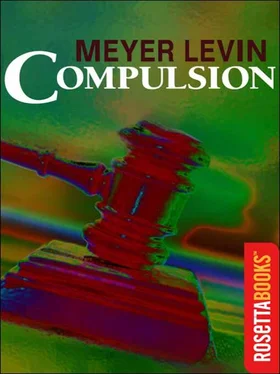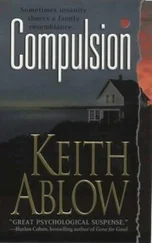While Artie was a disintegrating, a decomposing, personality, saying he had had all he wanted out of life, the alienist showed us Judd as incessantly active, cataloguing churches as a child, then investigating ornithology, analysing languages, and even now in jail projecting a book he would write to explain himself, a speech he would make from the scaffold if he were to hang. Indeed he was even planning a set of questions that he would answer from afterlife, should there prove to be any, though he did not believe any existed.
“So these two boys,” Dr. McNarry continued, in his even tone, “with their peculiar inter-digitating and complementing personalities” – he laced together the fingers of his two hands – “came into this emotional compact, with the Kessler homicide as the result.” It could be described, he said, as a folie à deux , rare enough, since it could not result unless the precise two personalities, by perhaps one chance in millions, came together.
The doctor emphasized this, probably as reassurance to the public, to the world; but even at the time I had a doubting thought: Wouldn’t the needed personalities somehow attract each other, to come together? And since then, of course, we have seen many other crimes out of such conjoinings.
The testimony of Dr. McNarry ended with Edgar Feldscher’s formal questions: “As a result of your examination and observation of the defendant Arthur Straus, have you an opinion as to his mental condition on the twenty-first day of May, 1924?”
“Yes, sir.”
“What is that opinion?”
“Well, I have practically expressed it. He was the host of antisocial tendencies along the lines that I have described. He was going in the direction of a split personality, because of this inner unresolved conflict… He is still a child emotionally, still talking to a teddy bear – somewhere around four or five years old. Intellectually, he passes his tests very well.”
As to Judd, he, too, was “the host of a relatively infantile aspect of his personality, but he has reacted to a defence mechanism, which has produced the final picture of a markedly disordered personality make-up in the direction of developing feelings of superiority which place him very largely out of contact with an adequate appreciation of his relation to others or to society.”
We had almost forgotten that it was a trial, a contest, until Horn came forward for the cross-examination. He turned to Artie’s “criminalistic tendencies”, and Judd’s lack of them. Did the doctor, for example, know who struck the fatal blows on Paulie Kessler’s skull?
There was a moment of hesitation as Dr. McNarry glanced toward the defence table. Wilk arose.
It would make no difference in the conduct of the defence if this point could be clarified, he said. The boys, by their own desire and that of their families, were being tried jointly, as they were inextricably bound in their act.
Horn repeated his question.
“Yes,” said Dr. McNarry. He spoke as though the detail were of little significance. “It was Artie.”
A woman’s shriek sounded over the courtroom hubbub. I noticed Myra, sudden tears on her face. Up to that moment she must still have been clinging to the idea of Judd as the devil.
Horn was asking how the doctor knew it was Artie.
“During one of our talks, there came a point where it was quite clear to me. I asked, ‘It was you who struck the blows, wasn’t it?’ and Artie nodded; he said, ‘You knew it’.”
I had a glimpse over my shoulder of Judd, staring at Artie with almost a reproving look.
The sensation had come late in the afternoon; court adjourned before I finished my call. The corridors were flooded with excited women; there seemed, indeed, to be a particularly sharp scent rising in the warm corridors from their inordinate agitation. In that moment, I saw Myra, slipping between the clots of women. I called her name. She clutched my arm, in that way she had. “Oh, Sid.”
“Sid,” she gasped, “they’re putting me on the stand tomorrow.”
How could that be? What of all the other psychiatrists?
“I don’t know, I don’t know. The lawyers just told me. Sid, I’m scared of that awful man.”
I reassured her. Horn was nobody to be afraid of; it was nothing to be on the stand. She had Wilk to protect her.
I waited in the park. Myra wanted me to walk her to Wilk’s apartment. The heat had not lifted, and the park was teeming. All at once she was there with me, wispy in the twilight. We stood a moment, listening to a middle-aged woman talking to her husband. “I thought all the time it was the dark one did it, that Judd Steiner, but if it was that boy Artie, I don’t understand how he could hit a kid – he looks such a nice boy. He must be insane.”
“It’s the way they were brought up,” the husband said. “Kids nowadays, they have everything too easy.”
We started walking. “Perhaps we’re all like that,” Myra said in her low breathy voice, “the generation that refused to grow up. We’re all babies emotionally.”
And as we walked: “Oh, Sid, should I say he was crazy, that he always acted crazy?” When Dr. McNarry had been describing Artie on the stand, Myra said, she had suddenly seen it so clearly, she had remembered so many scenes all tumbling together. The time he put on dark glasses and sat on the curb at Cottage Grove and 63rd, pretending to be a blind beggar, that was infantile – she had always said he was infantile, even to her mother… “Oh, the poor kid, if they do save his life, if he’s sent to an asylum, and some day becomes cured, will they ever let him out?”
And, leaning against me, she expressed her terror again. What was it like on the stand? That Sunday, when Horn’s men had come to see her, she hardly remembered what she had said. Could they hold her to what she had said?
As we entered Wilk’s apartment, Myra was taken over at once by Ferdinand Feldscher, who disappeared with her into a side room. There were conferences everywhere. In a corner of Wilk’s library, several of our fraternity brothers were being prepared to go on the stand. In the dining-room, there were members of Judd’s birding class, and a few campus intellectuals with whom he had argued philosophy.
I began to understand this sudden break in strategy. Dr. McNarry’s testimony had proved too strong; to follow him directly with other psychiatrists was to risk playing into Horn’s hands, to cause the case to go to a jury. Instead, there would be an interlude, with character witnesses, friends, girls, who would restore the image of Judd and Artie as college boys, active, bright, even attractive to perfectly normal young girls.
A hall door opened, and I could hear an entire segment of argument about whether to call the girls at all and expose them to cross-examination. Horn would stop at nothing; he would surely confront even the girls with the homosexual thing.
Suddenly a question stood clear in my mind. If Artie was the actual murderer, and Judd was involved only because of his homosexual love, what would Judd be if released from that love? Hadn’t some such release been taking place, through Ruth? Hadn’t he shown himself on the way to normal emotions?
As if my thoughts had summoned him, Willie Weiss stopped at my side. And with his uncanny penetration, he asked, “Worried about your girl going on the stand?”
It didn’t strike me then that he could have meant Myra, since I had brought her. I needed help, and in some stumbling way I made it clear to him, telling him all I knew about Judd and Ruth. He perched on the edge of a telephone table, immensely intrigued.
“You mean you think Judd was about to come out of it?” he asked.
“That’s what I want to know,” I said. And just then, as Dr. McNarry passed through the hall, Willie caught his arm. “This is quite interesting,” he told the alienist. And looking around: “Let’s go where we can talk.”
Читать дальше












